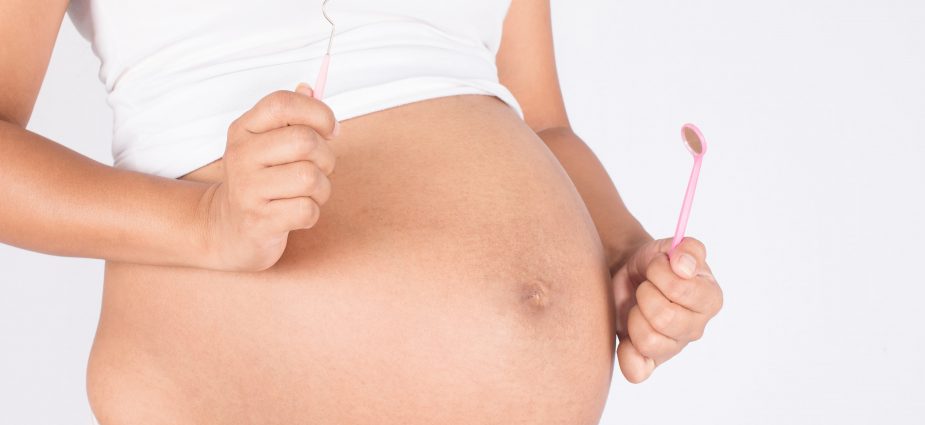Oral Health and Pregnancy

Expectant mothers and women contemplating pregnancy have unique considerations when it comes to dental care. Failure to adequately care for your oral health during this sensitive time could have serious consequences for you and your child.
During pregnancy, your teeth and gums are more susceptible to bacterial accumulation due to an associated increase in hormone levels. It is important to properly care for your teeth before, during and after pregnancy to safeguard your oral health and that of your unborn child. By maintaining your oral health, you will reduce your risk of pregnancy complications that can result if dental conditions are left untreated.
Oral Health Conditions Associated with Pregnancy
There are a number of oral health conditions associated with pregnancy; some common, some not so common. More often than not, these conditions can be prevented through proper oral hygiene practices and consultation with your dentist and medical professional.
Pregnancy-related oral health conditions include some of the following:
Pregnancy Gingivitis: Pregnancy gingivitis is a common condition affecting women during pregnancy. It is caused as a result of bacteria becoming trapped in between your teeth. It can be managed if diagnosed early enough.
Pregnancy gingivitis can yield a variety of symptoms, including:
- Red, swollen or tender gums
- The sensation of loose teeth
- Spaces between teeth
- Receding gums
- Bad breath
- Pus along the gums
- Change in bite
It is important to seek the advice of your dentist about gingivitis so that the condition does not progress into periodontal disease. The development of periodontal disease can be additionally problematic for pregnant women and their children.
Periodontal Disease: Periodontal disease can develop as a result of untreated gingivitis. Also called periodontitis, it leads to the deterioration of bone and surrounding gum tissue.
Periodontal disease may produce a variety of symptoms, including:
- Bleeding gums
- Inflamed gums
- Tender gums
- Chronic bad breath (halitosis)
- Tooth loss
- Infection
Periodontal disease can also be asymptomatic (producing no symptoms at all) even while silently causing erosion of your gums and supporting bone structure.
While periodontal disease is a concern for everyone, it is especially problematic for pregnant women. The development of periodontal disease during pregnancy poses an increased risk for pre-term labor and low birth weight babies. Pregnant women suffering from periodontal disease should consult with their dentist and medical doctor immediately.
Pregnancy Tumors (Pyogenic Granulomas): Pregnant women with gingivitis or periodontal disease are more susceptible to the development of pregnancy tumors, also called pyogenic granulomas. These tumors make it difficult for you to eat or speak and can cause discomfort. Pregnancy tumors can be removed by your dentist during pregnancy.
Dental Visits and Pregnancy
During your second trimester, it is important that you visit your dentist for an oral hygiene check up and professional dental cleaning. Dental care performed during pregnancy should be limited to that of a routine nature. Invasive restorative and cosmetic procedures should be avoided.
If you have a toothache, bleeding of the gums or pus around your tooth, schedule a visit with your dentist for a checkup. These symptoms may be signs of an oral infection which, if untreated, could spread throughout your body during pregnancy. Infections of the mouth or teeth during pregnancy increase the risk for complication.
Gum infections are the most common form of infection during pregnancy. Less common infections include abscesses inside or at the end of the root of a tooth. Such abscesses may require a root canal.
Dental Treatments to Avoid During Pregnancy
As stated above, there are a number of dental procedures that should be avoided during pregnancy.
X-rays: Although X-rays only produce a small amount of radiation, they are not recommended during pregnancy.
Extensive Dental Work: Restorative and cosmetic dental procedures including those that require you to sit in a dental chair for an extended period of time are not recommended during pregnancy. If you sit for long periods in the dental chair, you put increased pressure on the major blood vessel that supplies blood to your lower extremities which can make you feel faint.
Consult with your dentist and medical doctor to determine procedures that are deemed safe for you and your unborn child.
Self Help Dental Care Tips for Pregnant Women
Brush and Floss: Brush and floss three times a day to prevent the accumulation of bacteria on and around the teeth.
Morning Sickness and Vomiting Aids: Morning sickness and vomiting may be improved with a warm water or antibacterial mouthwash rinse. Baking soda used as toothpaste has been known to relieve an upset stomach; however, check with your doctor before using baking soda during pregnancy, especially if you have high blood pressure.
A Healthy Diet: A diet for healthy gums during pregnancy includes calcium, B12 and vitamin C.
Pregnant women who practice good oral hygiene and consult with their dentist and medical doctor are considerably less likely to experience problems throughout the term of their pregnancy. Oral health and general health are interrelated, as are the health of mother and child.


